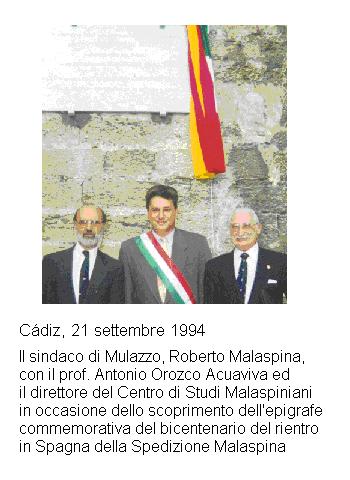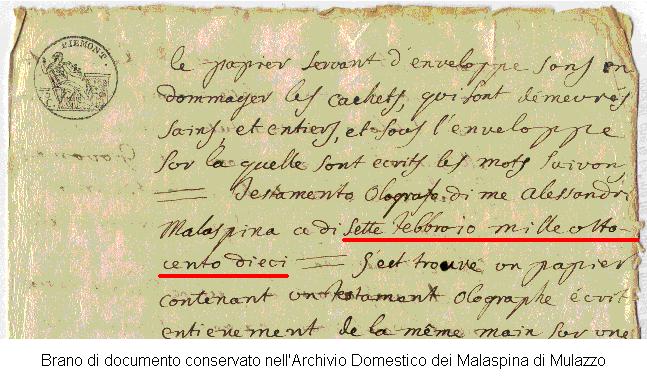C E N T R O D I S T U D I M A L A S
P I N I A N I
"ALESSANDRO MALASPINA"
Mulazzo, Massa-Carrara, Italy
Communiqué No. 3, December 10, 2000
Edited by Dario Manfredi, translated by John Black
A SAD LOSS
We have learned of the tragic death in recent months
of Prof. Antonio Orozco Acuaviva, professor of the History of Medicine
at the University of Cádiz, President of the Royal Hispanic American
Academy, and of the Academy of Medicine, and member of numerous other prestigious
cultural organizations, both Spanish and foreign.
For anyone doing research on the Malaspina Expedition,
the death of Prof. Orozco leaves a truly unfillable void. Here we
should like to remember not only the great value of his writings as contributions
to knowledge, but also his incomparable warmth and humanity. A sincere
friend of Italy, he is remembered also as having promoted, jointly with
this Centro, various initiatives including the provision of commemorative
epigraphs for Cádiz (1989 & 1994) and Mulazzo (1995).
To the family we send our deeply-felt condolences.

Without pretending to remember here the whole rich
intellectual oeuvre of Anthonio Orozco
Acuaviva, we lists only his work that more closely concerns the medical-sanitary
aspects of the Malaspina Expedition.
1981 - "Pedro María González y el 'Tratado de las enfermedades
de la gente del mar' [Pedro María González and the 'Treatment
of the Sick at Sea.']". XXVII Congreso Internacional de Historia de
la Medicina (Barcelona, 31 agosto-6 septiembre 1980), Barcelona, Academia
de Ciencies Mediques de Catalunya y Balears, 1981, pp. 394-400.
1982 - "Cádiz y las expediciones científicas a América
[Cádiz and the Scientific Voyages to America]."
La Corona y las
Expediciones Científicas Españolas a América en el
Siglo XVIII. Cádiz, Instituto de Cooperación Iberoamericana,
pp. 9-10.
1991 - "Los cirujanos navales en la Expedición Malaspina [Naval
Surgeons on the Malaspina Expedition]," OROZCO ACUAVIVA, A. (ed.), La
Expedición Malaspina (1789-1794). Bicentenario de la salida de Cádiz,
Cádiz, Academia Hispanoamericana - Comisión Nacional Quinto
Centenario, 1991, pp. 113-127.
1994 - (with CABRERA, Juan R.), " 'Avisos a los navigantes sobre la
conservación de su salud [Recommendations for Sailors on the Conservation
of Health]' (c. 1794), de [by] Pedro María González, 1764-1838,"
PALAU, M. - OROZCO, A. (eds.), Malaspina '92. I Jornadas Internacionales:
Madrid - Cádiz - La Coruña, Cádiz, Real Academia Hispano
Americana, pp. 89-114.
1995 - "Alessandro Malaspina y el protomédico de la Armada José
Selvareza [Alexandro Malaspina and José Selvareza, Proto-Doctor
of the Armada]" SAIZ, B. (ed.) Malaspina '93: Alessandro Malaspina e
la sua spedizione scientifica 1789-1794: Atti del congresso internazionale
nel bicentenario della massima impresa di Alessandro Malaspina, Mulazzo
- Cadiz, Centro "Alessandro Malaspina" / Real Academía Hispano Americana,
1995, pp.181-206.
1996 - "La 'ración del marinero' en la Marina Española
ilustrada [Mariner's Rations in the Enlightenment Spanish Navy]," OROZCO,
A. - PALAU, M. - CASTANEDO, J.M. (eds.), Malaspina y Bustamante '94.
II Jornadas Internacionales Conmemorativas del regreso de la Expedición
a Cádiz, 1794-1994, Cádiz - Santander, Real Academia
Hispanoamericana / Universidad de Cantabria / Astilleros de Guarnizo, pp.
60-71.
NEWS
1. The Region of Tuscany has organized the travelling exhibition "People
of Tuscany. Our histories in the world," devoted to Tuscans who emigrated
from the 18th to 20th centuries. It is anticipated that the exhibition
will also travel abroad, to countries where Tuscan immigration has been
great. In the exhibition there appear, besides many anonymous workers,
some illustrious Tuscans - from Filippo Mazzei, who was a friend of Jefferson,
to the singer Ives Montand (whose true name was Ivo Livi). One of the first
panels in the exhibition (prepared with the collaboration of the Centro
di Studi Malaspiniani) is about Alexandro Malaspina
and his scientific expedition.
2. The Centro di Studi Malaspiniani has acquired a 19th century map
representing the Gulf of La Coruña (Galicia, Spain). The topographical
surveys used in drawing the map, making up part of the publication The
Little Sea Torch: or, True Guide for Coasting Pilots (London, Debrett,
1801), were probably carried out shortly before the publication of the
volume, indeed just at the time when Alexandro Malaspina was confined in
the castle of St. Antón. It is possible that Alexandro, from the
window of his cell, was able to observe the hydrographers while they were
making their measurements.
OUR LIBRARY
Latest publications received at the Centro
Gente di Toscana. Nostre storie nel mondo [People of Tuscany. Our
histories in the world], Florence, Region of Tuscany, 2000, 192 pp.
Pps. 20-23 are devoted to the Malaspina Expedition,
with reproductions of sketches of the Philippine Islands,Vavau, Lima and
the northwest American coast.
ARCA PETRUCCI M., CONTI S. (eds), Giovanni Caboto e le vie dell'Atlantico
Settentrionale. Atti del Convegno di Studi.Ark [John Cabot and the Sealanes
of the Seventeenth Century North Atlantic. Proceedings of the Research
Conference]. Genoa, Briugati, 1999, 580 pp.
The volume contains D. Manfredi's article "Sulla
prima edizione del viaggio di Malaspina, S. Pietroburgo [On the first edition
of the Voyage of Malaspina, St. Petersburg], 1824-1827" (pp. 485-504).
DISCUSSIONS
On the year when Alexandro Malaspina died
In truth, there should not exist any debate about
this biographical date, since there are hundreds of documents, many of
which were edited many years ago, showing that the date of the death of
Alexandro Malaspina was indeed April 9, 1810.
Nevertheless, we see that indications to the contrary
still appear (most of them suggesting 1809), even in places and publications
whose authority and seriousness are recognized (for example, in the bibliographical
data of the Library of Congress, Washington, DC, USA).
For this reason, on the usual supposition that pictures
speak louder than words, we reproduce here the fragment of a document which
is preserved, unpublished, in the files of the Centro di Studi Malaspiniani
in Mulazzo.

It deals with the official wording of the opening
of Alexandro Malaspina's will. From what is written it emerges clearly
that the second (and last) will of the Navigator was written on February
7, 1810. It is therefore obvious that Malaspina could not have died
in 1809!
The document is partially written in French since
in that year Pontremoli (along with all the
remaining territory previously belonging to the Grand Duchy of Tuscany
- then the Kingdom of Etruria) had been incorporated into the French Empire.
TO THE READER
Please remember that news about Alexandro Malaspina
and the initiatives dealing with him
can be found (in English) at the site:
http://www.mala.bc.ca/~black/amrc/comun.htm
or: http://www.mala.bc.ca/~black/amrc/amrc.htm
As for our Centro, we remind you that information
its structure and operation can be read at:
http://www.lunigiana.net/mulazzo/malaspina.htm
Those who would like to submit enquiries about Malaspina
or his expedition, should send messages to the following address: mu.spina@lunigiana.ms.it
Return to AMRC Homepage
Italian Original

